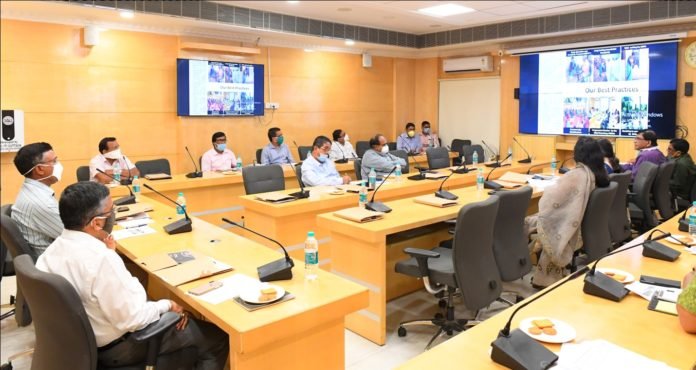- Chief Secretary directed to intensify converged IEC with Covid-19
- DAMAN Programme extended up to 2030-31.
- ELISA machine to be installed in all District and Sub-divisional Hospitals
Bhubaneswar: Jun 02: Odisha has made spectacular progress in containing the vector and water (V&W) borne diseases during the last years. This was known from the Inter-departmental Coordination meeting held under the Chairmanship of Chief Secretary Sri Asit Tripathy in Lokseba Bhawan Conference hall today.
Additional Chief Secretary Health & Family Welfare Sri Pradeepta Kumar Mohapatra outlined the issues and Special Secretary Health Smt Shalini Pandit presented the updates for discussions.
Chief Secretary Sri Tripathy directed the department to workout an integrated IEC model for vector & water borne diseases with Covid-19; and, intensify the campaign in both the rural and urban areas before and during the ensuing monsoon.
Chief Secretary also directed the departments of Panchyati Raj & Drinking Water, Women, Child & Mission Shakti Development, Housing & Urban Development, Labour & Employment, Forest & Environment, Industries, School & Mass Education, ST & SC Development, Agriculture & Farmers’ Empowerment, Fisheries & Animal Resource Development, Information & Public Relations, Steel & Mines and Commerce & Transport to have concerted efforts for making the interventions more sharp and effective.
The meeting resolved to establish ELISA machines in all the district head quarter and Sub-Divisional Head Quarter hospitals. DAMAN, the Odisha model for elimination of malaria in remote areas was extended for coming ten years up to 2030-31.
It was also decided to set up State Referral Laboratories in the new four medical colleges for all types of pathological tests. Earlier three old medical colleges had this facility.
Chief Secretary directed the Director Fisheries to upscale implementation of biological control of the diseases through larvivorous fish. Department was directed to construct more number of Mother and Mini hatcheries for this species in high burdern districts to support vector control measures.
It was also decided to get more 20 lakh insecticidal mosquito nets for high burden CHC areas. Chief Secretary Sri Tripathy emphasized on capacity building of the community and frontline workers like Goan Kalayan Samiti, ASHA, ANM and SHGs.
Special Secretary Smt Pandit appraised that common vector borne diseases include malaria, Dengue, Chikungunia, Filariasis and Japanese Encephalitis. The common water borne diseases include acute diarrhoea and viral hepatitis. She further mentioned that because of targeted interventions, Odisha recorded 81% decline in Malaria cases during 2018 which further reduced by 41% in 2019. In the year 2017, total malaria positive case was 3,47,860 with death tool of 24. In the year 2018, the total malaria positive came down to 66,311 with death toll of three. In 2019 the total positive case further came down to 39,500 and, up to 2020 April the total positive case was 11,302 with death toll of one.
The Annual parasitic incidence (API) per thousand population was 10.06 in 2017 which came down to 0.88 in the year 2019. The districts of Kendrapara and Jagatsinghpur have been nominated for national award for ‘no malaria case’ during last two years. Presently, 23 districts of the State are on fast march towards elimination of malaria. The API rate in these 23 districts is below than one during last two years. Director Public Health Dr Ajit Mohanty appraised that integrated intervention would be focused on 32 blocks of seven districts namely Malkangiri, Rayagada, Koraput, Kandhamal, Ganjam and Gajpati.
Similarly, Dengue fever, once considered fatal has been kept under complete control in the State. Available data show that in the year 2016 the total number of dengue positive case was 8,380 with death toll of eleven which was reduced to total positive case of 3,758 with death toll of four in 2019. No dengue death has been reported up to May of the current year.
Additional Chief Secretary Sri Mohapatra said, “Proactive prevention, community mobilization, extension of outreach to the most difficult pockets through integrated effort, extensive testing & treatment, distribution of insecticide mosquito nets along with State initiative of DAMAN have been our best practices in containing the V & W borne diseases”.
Additional Chief Secretary Sri P.K. Mohapatra, Principal Secretary Commerce & Transport Sri Madhusudan Padhi, Principal Secretary Water Resources Sri Surendra Kumar, Principal Secretary ST & SC Development Smt Ranjana Chopra, Special Secretary Health & Family Welfare Smt Shalini Pandit, Director Health Services Dr Bijaya Mohapatra, Director Public Health Dr Ajit Mohanty, State Programme Officer Dr Pramila Baral along with senior officers of concerned departments participated in discussions.




























